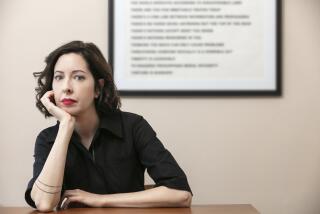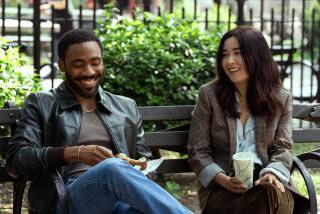MOVIE REVIEW : Plain âJane Eyreâ Searches for a Fiery Sense of Passion
The movies have always been fond of âJane Eyre,â as well they might be of a book capable of inspiring ad copy like âA love story every woman would die a thousand deaths to liveâ (crafted for the 1944 Joan Fontaine-Orson Welles version). A Romantic novel with a capital R, its tale of a plain governess coping with a fancy house and the man who owns it is so potent the work has never been out of print since its original publication in 1847.
Keeping everybody enthralled from that day to this has been the combustible passion author Charlotte Bronte poured into her book. Every bit as fiery as her heroine, Bronte saw her novels as a kind of antidote to the more distant work of her near-contemporary Jane Austen, of whom she tartly wrote, âHer business is not half so much with the human heart as with the human eyes, mouth, hands and feet.â
Director Franco Zeffirelli, as well known for directing operas as films like âRomeo and Julietâ and âEndless Love,â is certainly familiar with excessive emotions, so much so that going over the top is always a potential pitfall for his projects. So it is baffling to have to report that Zeffirelliâs version of âJane Eyreâ suffers from, of all things, a shortage of intense, identifiable passion.
Working from a well-made script by Hugh Whitemore (âStevieâ) and Zeffirelli, âJane Eyreâ sticks fairly close to the novel, does well in conveying the physical atmosphere of mid-19th century England and is in all respects an honorable version. But the casting of Charlotte Gainsbourg as Jane and William Hurt as Rochester, though well intentioned and defensible, delivers so skimpily on the emotional level that the movie feels as if all the feeling has been leeched out of it.
Underlining that casting difficulty is the segment that focuses on the young Jane, played by âThe Pianoâsâ Anna Paquin, perfect for the part and immediately believable as someone in whom passion runs amok.
An orphan forced to live with cruel relatives, Jane is soon shipped off to the grim Lowood School, where the humorless Mr. Brocklehurst (John Wood) makes unsuccessful attempts to break her spirit. Unfortunately, Paquinâs acting notwithstanding, this opening half-hour is so overdone it verges on parody, and when weâre told that Janeâs young friend Helen has âgone to a better place,â we suspect itâs to another movie.
Soon enough Paquin is replaced by Gainsbourg, an actress who has worked largely in France. From a visual point of view, the plain-looking Gainsbourg, the daughter of British actress Jane Birkin and French singer-songwriter Serge Gainsbourg, is an intriguing choice, even down to looking somewhat like Bronte herself.
Severe and awkward, Gainsbourg is initially successful as a character who is supposed to be charmless and without beauty. And the seriousness of her demeanor helps to calm the movie down as Jane takes a job as governess for a little girl named Adele (Josephine Serre) in a massive old pile known as Thornfield Hall.
Also helping the proceedings is veteran Joan Plowright, a spirited actress who knows just how these things should be done. As the cheerful Mrs. Fairfax, Thornfieldâs housekeeper, she makes Jane feel so at home the girl doesnât worry much about that sinister laughter coming from the attic or particularly notice that the houseâs owner and Adeleâs guardian, Edward Rochester, seems at great pains to avoid his own home.
As the quixotic Rochester, Hurt is also a different kind of choice from the more conventionally magnetic actors like Welles and George C. Scott whoâve played the part in the past. His morose character is a hard man to read and not a happy one, but he does not feel particularly dark or romantic. Hurtâs quiet performance is thought-out and intellectually interesting, but it is not involving in any way that matters.
The same is finally true of Gainsbourgâs work. Yes, Jane should be plain, but she doesnât have to be glum, sullen and dull as a stick in the bargain. Yes, Jane makes the requisite speech about being âan independent human being with a will of my own,â but her undertakerâs apprentice demeanor effectively stifles the life force this character ought to project.
Similarly, and more critically, the passion Rochester and Jane come to feel for each other is beyond the capacity of these actors to effectively convey. They are finally unbelievable as a romantic couple not because theyâre not conventionally attractive but because their emotions are not accessible to an audience. Anyone whoâs looking for a convincing modern version of âJane Eyreâ may have to wait until Paquin is old enough to play the role herself.
* MPAA rating: PG, for thematic elements and brief violence. Times guidelines: chaste all the way around.
âJane Eyreâ
William Hurt: Rochester
Charlotte Gainsbourg: Jane Eyre
Joan Plowright: Mrs. Fairfax
Anna Paquin: Young Jane
Geraldine Chaplin: Miss Scatcherd
Billie Whitelaw: Grace Poole
Maria Schneider: Bertha
Released by Miramax Films. Director Franco Zeffirelli. Producer Dyson Lovell. Executive producers Bob Weinstein, Harvey Weinstein. Screenplay Hugh Whitemore & Franco Zeffirelli, based on the novel by Charlotte Bronte. Cinematographer David Watkin. Editor Richard Marden. Costumes Jenny Beavan. Music Alessio Vlad & Claudio Capponi. Production design Roger Hall. Art directors Dennis Bosher, Raimonda Gaetani. Running time: 1 hour, 52 minutes.
* Exclusively at Goldwyn Pavilion Cinemas, Westside Pavilion, 10800 W. Pico Blvd., (310) 475-0202; and Edwards South Coast Village, 1561 Sunflower Ave., Santa Ana, (714) 540-0594.
More to Read
Only good movies
Get the Indie Focus newsletter, Mark Olsen's weekly guide to the world of cinema.
You may occasionally receive promotional content from the Los Angeles Times.











